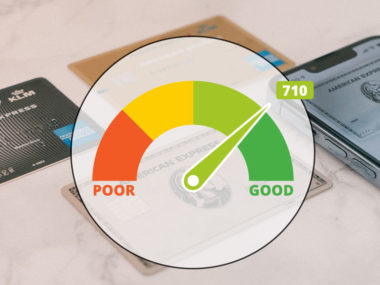According to reputed credit reporting company Experian, your credit score of 570 officially ranks as “Very Poor.” While not a finished product, your current score will make certain financial moves difficult, but not impossible.
The first step to fully understanding a credit score of 570 is understanding all the factors that affect your credit score itself. Used by prospective lenders to determiperne your capability of repaying a loan, your credit score is fundamentally important in securing property and personal loans, credit cards and respectable auto insurance premiums.
Good credit scores can help you spend your money as you please, just as easily as problematic credit scores can impair your financial goals.
Improving your overall credit score is easier with more frequent reporting, to familiarize yourself with your current credit standing on a more regular basis. Free, easy and safe for use, secure credit reporting from AnnualCreditReport.com keeps you continually up to date on any credit score improvements or fluctuations.
Table of Contents
Why Your Credit Score Is 570
While it’s not possible to identify exactly which factors determine your overall credit score, common influences on a Very Poor credit score of 570 include a short overall credit age, defaulted loans, and inconsistent payment history.
Young Credit Age
Credit age accounts for 10% of your total credit score, and has nothing to do with loan repayment or total debt. Rather, the age of your credit is simply the length of time during which your existing credit accounts have been active.
It takes time, but after months and years of activity, credit accounts begin to mature and reflect more positively on your overall credit score.
With a credit score of 570, you’re likely adversely affected by your overall credit age. Keep in mind that the credit age affecting your credit score is the average overall age of all active accounts.
Opening new lines of credit, even when necessary, weakens overall credit age and can have a similarly negative effect on your credit score as a whole.
Defaulted Loans or Account Bankruptcy
A credit score of 570 might also mean you have accounts in more serious trouble. Accounts with repeated or chronic missed payments might default, and require legal action to restore them.
Even if defaulted loans are paid off, they can impose significantly negative consequences on your credit score. Even worse, if you file for bankruptcy, it can mean a credit score decrease of hundreds of points.
In addition, bankruptcy can remain on your financial record for up to 10 years, serving as a serious red flag for potential future lenders.
If you have debt owed to collections agencies, prioritize those payments before circumstances worsen. Specifically, pay off loans to collections agencies before fees or penalties worsen, before interest rates increase, and certainly before an agency elects to take legal action to resolve the matter.
Inconsistent Payment History
In the same way that consistent, complete payments toward your credit balances can help improve your credit score, incomplete or missed payments altogether will only hamper your credit score of 570.
Inconsistent payment history is one of the signs of a Very Poor credit score, since incomplete payments could be preventing your credit score from seeing the increases you’re looking for.
The solution to an inconsistent payment history is easy in theory and difficult in practice: make complete, on-time payments. Start by eliminating unnecessary purchases from your shopping habits, allowing you to dedicate the largest possible percentage of monthly wages toward your credit statements while remaining financially responsible.
If you haven’t set up automatic payments, consider doing so. Or, schedule automatic reminders on your electronic calendar or phone to prevent you from missing a pending credit repayment deadline.
What Can You Do With a 570 Credit Score?
With a credit score of 570, you’re likely facing an uphill battle when it comes to securing a loan, a new credit line, or a reasonable insurance premium. However, there are still options available to you and your wallet, allowing you to make predictive financial decisions and form the foundation for concrete future debt repayments.
Consult the detailed information below on the specifics of what you can and can’t accomplish with a credit score of 570, from credit cards to car insurance.
- Personal loans are useful when put toward a personal project, whether that be a home renovation, surprise trip, or an unexpected medical bill.
- A credit score of 570 leaves you unable to secure a traditional personal through a reputable financial institution.
- However, personal loan options specifically for bad credit can still help deliver funds when you need them.
- If you do commit to a special mortgage loan optimized for Very Poor credit, ensure that it doesn’t come with sneakily high interest rates or expensive “protection” fees.
- In a pinch, certain lenders who deal specifically with bad credit may be able to help.
- Some apartment communities understand that renters don’t have the benefits of mortgage-based credit increases, though that won’t make them any less wary of risky tenants.
- If you are approved for an apartment with your current credit score, stay aware of hidden fees or extra-high security deposits.
- While top-tier rewards credit card options aren’t yet available to you, you can still qualify for a secured credit card.
How to Repair a 570 Credit Score
Repairing a credit score of 570 isn’t a quick process. You’ll probably need to change the way you view your payment history and your credit limit, prioritizing complete, on-time balance repayment over almost all other purchases.
Repairing a 570 credit score means eliminating debts to collections agencies, addressing any loans in default, as well as avoiding bankruptcy and its many penalties on your credit score.
Many individuals with especially low credit scores opt to let the professionals handle the credit rebuilding process.
Some of the best credit repair agencies can help you with just about every aspect of credit score improvement. This may include navigating civil judgments and collections, as well as consolidating debts and collaborating directly with credit bureaus to restructure loans and renegotiate terms for your benefit.
Image Source: https://depositphotos.com/





